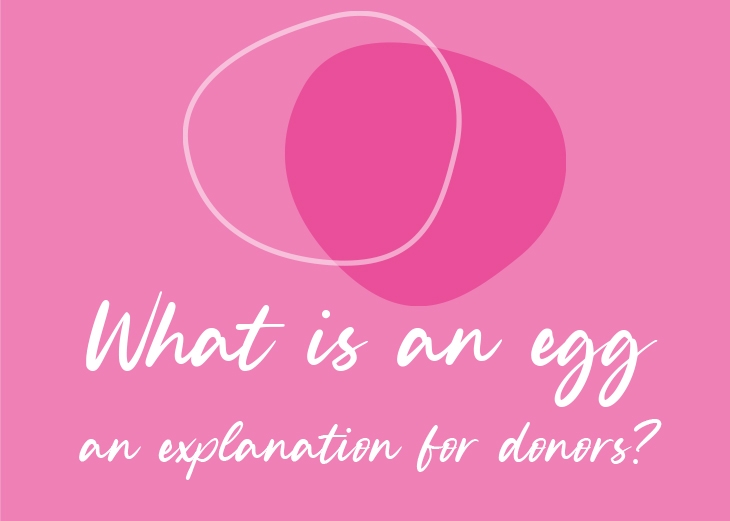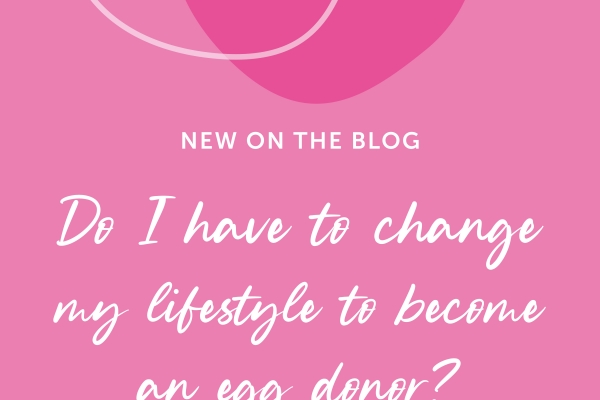This information was correct at the time of publishing. It may not reflect our current practices.

There is no greater gift than donating your eggs to help someone start a family. When a woman chooses to donate her eggs, she is giving someone who is unable to conceive the chance to have a child of their own. All of our donors have the same desire to help other women and, all with something in common - great kindness, empathy, and commitment to giving the gift of life.⠀
If you’re thinking about egg donation, it’s only natural that you may have some questions, and we do get asked about how donating could impact your eggs; the truth is there is no impact to your fertility and your eggs. So here we have explained everything you need to know about a woman’s eggs.
What is an egg cell?
The egg cell is the largest cell in the human body. Even so, it’s only about the width of a human hair and barely visible to the naked eye. It would take nine eggs to reach one millimetre in length, and if you laid 100 of them side by side, they would measure just 1.2cm long.
To put this into perspective, an egg cell is about 4 times bigger than a skin cell, 26 times bigger than a red blood cell, and 16 times bigger than a sperm cell! Yet each tiny cell has the potential to develop into a baby. So, let’s take a much closer look at the egg structure under the microscope.
How many do you have?
A woman is typically born with two ovaries which contain the follicles that have the potential to become eggs. When you are fetus inside you mother’s womb, you have millions of follicle. From birth onwards, these will continuously decline until you run out of the follicles and attain menopause.
That’s the story for most women – but, sadly, it’s not always so straightforward. Approximately 1% of women will experience premature menopause (or premature ovarian failure), meaning they run out of eggs well before the average age of menopause. Many women with advanced age may have eggs but have poor quality eggs. That’s why our incredible donors make such an important difference to these women’s life.
How your eggs develop naturally
At the beginning of your menstrual cycle, a hormone stimulates the follicles in your ovary. Out of many follicle available in that month, one becomes dominant and develop an egg. The egg then goes through various stages of development – known as oogenesis – until it is eventually released during ovulation. The lagging smaller follicles are reabsorbed by the body.
Eggs are precious.
On average, a women only ovulates approx. 400 to 500 eggs in her lifetime. That makes eggs far rarer than sperm. In fact, more sperm cells are released during a single ejaculation than a woman produces her entire life.
An egg doesn’t live for very long after ovulation
The egg cell starts to deteriorate very quickly after ovulation, and the fertile window starts to close. After around 12 to 24 hours of being released, the egg cell will die if unfertilised, and it won’t be possible to become pregnant until the next ovulation.
Egg quality
Egg quality means how capable an egg is of being fertilised and developing into a viable embryo. Different factors can affect the quality of the eggs, making it difficult or impossible for some women to conceive. Two of the most important factors are the genetic structure inside the egg and the energy supply by mitochondria. Both of these decline with age, which affects eggs potential to be viable and get fertilized.
How we are supporting our amazing donors.
Women have been donating with us for over 30 years, and we have been lucky enough to see how our wonderful donors have had a positive impact in helping families reach their dream of having children.
Here at Manchester Donors, we understand becoming an egg donor isn’t an easy decision to make, so it is important to ensure our donors receive the highest standard of care and support at every stage of the process. It is one of the most selfless acts of kindness a woman can do, which is why our compassionate, dedicated donor team continues to make our egg donor's journey the best it can be.
By choosing to become an egg donor, you are making a difference in someone’s life. It is a truly rewarding gift. Read the wonderful message our donors have to say here.
Our friendly, dedicated Donor Team are here to support our donors every step of their donation journey. If you would like to find out more about becoming an egg donor, contact our expert Team on 0161 300 2734 or go to our website to find out more >> manchesterdonors.com.
We know it takes an incredibly selfless person to donate their eggs to an individual or couple who are unable to conceive and give them the chance...

Start your journey to become an egg donor. Give the gift of life today!